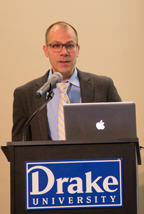 Timothy Knepper is Professor of Philosophy at Drake University, where he directs The Comparison Project, a public program in global, comparative religion and local, lived religion. He is the author of books on the future of the philosophy of religion (The Ends of Philosophy of Religion, Palgrave, 2013), the sixth-century Christian mystic Pseudo-Dionysius the Areopagite (Negating Negation, Wipf & Stock, 2014), and an introduction to global-critical philosophy of religion (Global Philosophy of Religion, Bloomsbury, 2022. He is the editor of student-written photo-narratives about religion in Des Moines (A Spectrum of Faith, Drake Community Press, 2017) and in Beijing (Religions of Beijing, Bloomsbury, 2020), as well as The Comparison Project’s lecture and dialogue series on ineffability (Ineffability: An Exercise in Comparative Philosophy of Religion, Springer, 2017), death and dying (Death and Dying: An Exercise in Comparative Philosophy of Religion, Springer, 2019), and miracles (Miracles: An Exercise in Comparative Philosophy of Religion, Springer, 2022). We invited him to discuss comparative philosophy of religion as part of our “Philosophers of Religion on Philosophy of Religion” series.
Timothy Knepper is Professor of Philosophy at Drake University, where he directs The Comparison Project, a public program in global, comparative religion and local, lived religion. He is the author of books on the future of the philosophy of religion (The Ends of Philosophy of Religion, Palgrave, 2013), the sixth-century Christian mystic Pseudo-Dionysius the Areopagite (Negating Negation, Wipf & Stock, 2014), and an introduction to global-critical philosophy of religion (Global Philosophy of Religion, Bloomsbury, 2022. He is the editor of student-written photo-narratives about religion in Des Moines (A Spectrum of Faith, Drake Community Press, 2017) and in Beijing (Religions of Beijing, Bloomsbury, 2020), as well as The Comparison Project’s lecture and dialogue series on ineffability (Ineffability: An Exercise in Comparative Philosophy of Religion, Springer, 2017), death and dying (Death and Dying: An Exercise in Comparative Philosophy of Religion, Springer, 2019), and miracles (Miracles: An Exercise in Comparative Philosophy of Religion, Springer, 2022). We invited him to discuss comparative philosophy of religion as part of our “Philosophers of Religion on Philosophy of Religion” series.
Global (-critical) philosophy of religion has a problem of categories. That is not the only problem it has; it also has problems of content, method, critical perspectives, and end goals. But its problem of categories is most severe.
Over the last 20 or so years, philosophers of religion have done a commendable job of enriching and diversifying its content. However, if the content of philosophy of religion is diversified within the framework of the same old categories, topics, questions, and problems of western philosophy of religion, then diversification risks colonization, as more and more “other” religio-philosophies are drawn into the orbit of theistic, analytic, or western philosophy of religion. This leaves these “other” religio-philosophies looking weird, wanting, or wrong.
The majority of this short essay will propose and elaborate four different ways in which global philosophy of religion has rethought or might rethink its fundamental categories of inquiry. However, let me first give three abbreviated arguments as to why I think the categories of western philosophy of religion are not conducive to its globalization.
First, the core stock of topics, questions, and problems from western philosophy of religion—attributes and proofs of God, problem of evil, and immortality of the soul—are not commonly and widely found as such in the non-western or indigenous religio-philosophies of the world. Second, given that attributes/existence of God always comes first in western philosophy of religion, it significantly shapes that which follows, especially evil/suffering, which is or becomes a problem for God/gods; however, for most religio-philosophies, evil/suffering is not a problem for some God/gods; here we have one of several issues of order and sequence. Third, a quick survey of global religio-philosophical traditions, especially not of modern-European lineage, suggests that the core issues of central concern instead involve self and reality, especially the binding conditions and liberative practices of the former, and the means of knowing and ways of attuning oneself with the latter.
This third argument is the most debatable, for we global (-critical) philosophers of religion still seem not to know which issues, if any, are widespread among the religio-philosophical traditions of the world. Herein lies the primary problem for the future of global philosophy of religion: categories. This problem has been front and center for a group of philosophers going by the name “Global-Critical Philosophy of Religion” (GCPR), who have been active in the American Academy of Religion over the last eight years (and were just approved for permanent status). Over this time, several different types of solutions to the problem have been proposed and enacted, four of which I highlight here.
First, there is what I call “flipping the script.” This approach simply takes up one or more core questions and categories from some “other” religio-philosophical tradition or socio-historical context, requiring all the others to articulate positions with respect to those questions and categories. Although this approach has not yet been enacted in writing as such, at least by members of GCPR (to my knowledge), it is one of two goals of an NEH-funded, GCPR mini-conference (which occurred in March 2022) and essay-collection (which should be out by early 2024). At the conference, nearly two-dozen scholars were asked to reimagine the fundamental topics, questions, and categories of philosophy of religion from different socio-historical contexts, religio-philosophical traditions, and methodo-theoretical perspectives (which collectively encompassed East and South Asia, sub-Saharan Africa, native North America, the medieval Mediterranean, and the marginalized modern-European). Although one goal of the essay-collection “aims higher,” aspiring to rise from these localized sets of topics, questions, and categories to an all-embracing cluster (see immediately below), each of these localized sets can serve as a means of re-centering the field from a perspective other than modern-western philosophy of religion, thereby accomplishing one of the classic goals of the academic study of religion—making the familiar strange, and the strange familiar.
This second goal of this essay collection is the second “way forward” of this short essay. I call it “inductive-comparative” because it begins in the particulars of individual religio-philosophies and “works upward,” looking for areas of significant overlap, aspiring ultimately to “rise up” to a set of common categories for all—or at least many different—traditions (while still recognizing singularities of uniqueness). What are such categories? Although it is not possible yet to say for sure, since we have only received about one-third of the essays, preliminary findings suggest the following: (1) that we de-center “God” and proofs of “His” existence, while admitting a variety of gods, spirits, ancestors, and other “super-human” beings and realities (including what I am currently calling “divine architectures”—the rich, multi-faceted realms of divine beings and principles, e.g., divine names as causal emanations); (2) that we focus instead on traditionally neglected topics involving practices, paths, obstacles, ends, selves, and cosmoses, especially the inhibitive conditions and liberative practices of the self and the means of knowing and ways of attuning oneself with the cosmos; (3) and that we include issues of power, inequity, and injustice as topics of philosophy of religion per se (rather than relegating them to “feminist” or “postcolonial” philosophies of religion).
The third way forward is that of Gereon Kopf, with whom I co-founded GCPR as a seminar in 2015. Although I characterize this approach as “dialogical-situational,” Gereon originally referred to it as “multi-entry” (and now refers to it as fourth-person or multi-logical), since its book incarnation (co-edited with Purushottama Bilimoria) includes eighteen different “paradigms,” any one of which can serve as a point of entry, and every one of which describes and assesses two other paradigms and is described and assessed by two additional paradigms. For me, though, the brilliance of the project occurred on our day of dialogue with those paradigms that we evaluated and that evaluated us. Although the project itself has ends that lie beyond these dialogues (namely, its publication) and also methods and categories that undergird these dialogues (“philosophy,” “religion,” “describe,” “assess”), it is does not aim to produce a final set of all-embracing topics, issues, or categories for global-critical philosophy of religion. One might say, rather, it seeks only situational categories for dialogical understanding and reflection.
Fourth and finally, there is the “way forward” of my undergraduate textbook that was just published (Philosophies of Religion: A Global and Critical Introduction, Bloomsbury, 2022). Substantively, it is rooted in the basic metaphor “life is a journey,” from which it deduces five component parts of this metaphor: traveler, origin, destination, path, obstacles. (These are stated first in terms of the self, then in terms of the cosmos.) These vague metaphorical categories (e.g., Where do I come from?) are then made more philosophically precise (e.g., Am I originally free, good, enlightened?) as they are “specified” with content from the six different religio-philosophical traditions and meta-traditions covered in the book (East Asian, South Asian, Abrahamic, Yoruba, Lakota, modern European). In some cases, a considerable amount of “trial and error” was involved in this specification, as I made my questions, topics, and categories vulnerable to “the data” in ways that did not unduly privilege any one tradition. One could therefore also call this approach “hypothetico-corrective.” What is important here, however, is that, like approach #2 above, it attempts to provide an all-encompassing set of questions for global-critical philosophy of religion (while again noting what is singular and unique).
No doubt there are plenty of more “ways forward” than these four. It is high time we global (-critical) philosophers of religion got busy exploring, articulating, and deploying them.

